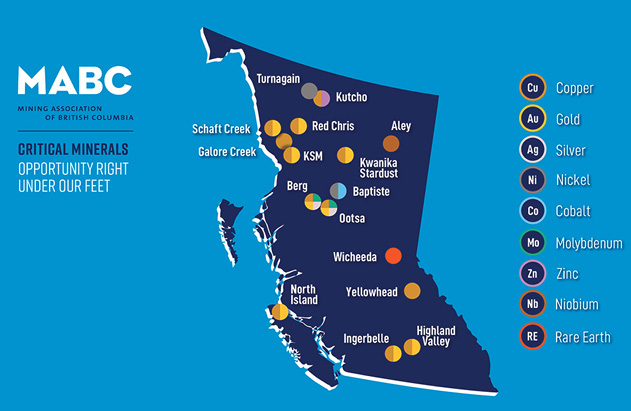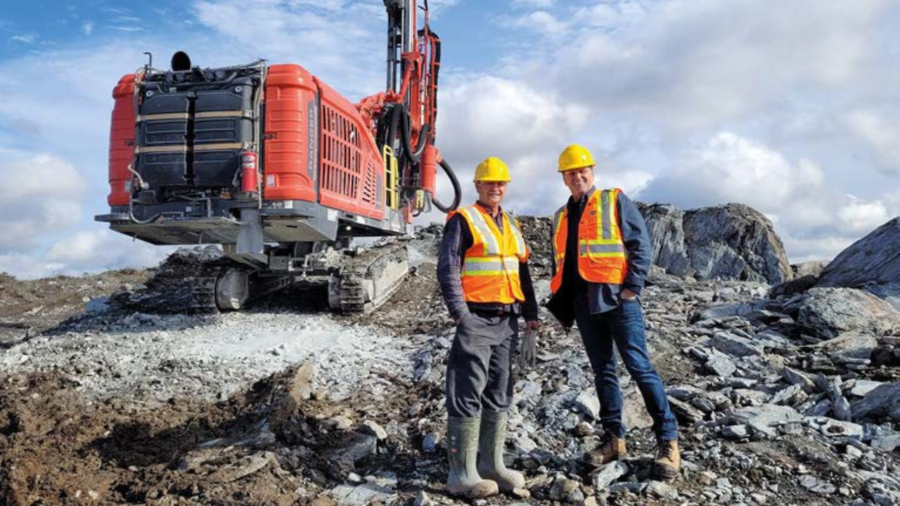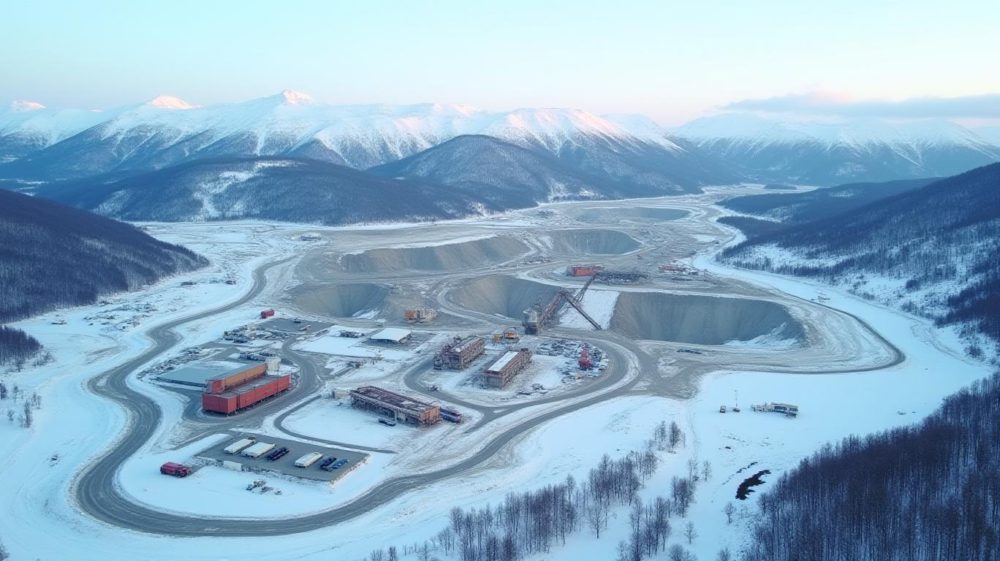Critical mining in British Columbia: $36 billion in critical minerals investment at stake

Q & A with Michael Goehring, president and CEO of MABC
Sixteen proposed critical mineral mines, representing $36 billion in near-term investment, 300,000 person-years of employment, and $11 billion in tax revenues, are at a key juncture, based on findings of a new independent economic impact analysis conducted for the Mining Association of British Columbia (MABC). The study evaluated the potential economic impact of proposed new critical mineral mines and extensions to existing critical mineral mines in B.C.
The study examined 14 potential critical mineral mines and two mine extensions and found the long-term economic impact of operating these mines over several decades could be nearly $800 billion.
Critical minerals can provide B.C. with a potential short and long-term economic boost and position the province to be a key player in the global market.
The mining industry in B.C. supports more than 35,000 jobs and over 3,700 small, medium, and First Nations businesses in every corner of the province through an annual spend of $3 billion.

president and CEO of
MABC. CREDIT: MABC
Despite his busy schedule, Michael Goehring, president and CEO of MABC, spoke with the Canadian Mining Journal about the current state of B.C.’s and Canada’s mining industry.
Q: Can you talk to us about your background? How did you benefit from your previous experience in your current role?
A: Prior to joining MABC, I was a partner in Canada’s largest public relations and public affairs agency where I specialized in the natural resource and mining sectors. Our clients brought us unique and complex challenges to solve, ranging from regulatory and policy obstacles to high-wire issues management. This experience has been beneficial in positioning me in my current role. I joined MABC in 2019 and have not looked back! Mining is a great industry. There is an evolving understanding and recognition of how important mining is to everyday life; and of course, to the global energy transition.
Q: In your opinion, what are some of the major issues affecting the mining sector in B.C.?
A: There are four major issues in my opinion:
1. Continuing to sharpen the fiscal competitiveness of mining in B.C.
2. Fast-tracking permitting authorizations and project execution.
3. Enhancing Indigenous participation and advancing economic reconciliation.
4. Accelerating new and strategic investments in electrification infrastructure ― which drives emissions reduction and aligns with global net-zero commitments. There is an urgent need to meet the rising demand for critical minerals essential for electric vehicles, wind turbines, solar panels necessary to support the energy transition.
Q: What are some of the under-represented mining industry issues in general?
A: At MABC, we have made several recommendations to the government of B.C. and the government of Canada relating to the speed of permitting when it comes to new mining projects, of course without compromising environmental protection.
While we know that the federal government plans to reduce the time it takes to develop new critical mineral mines from 12-15 years to potentially five years, we need to see action and alignment between both governments to come together to make this happen now.
Enhancing Indigenous participation and advancing economic reconciliation is also critical. We have consistently made two recommendations to governments: First, we need to see coordinated assistance for Indigenous governing bodies to allow them to build their own governance, technical, and administrative capacity, on their terms, to participate in government-to-government processes and shared decision making. Second, provincial and federal governments need to cooperate to develop financial instruments that will enable Indigenous co-ownership and equity positions in critical mineral and other natural resource projects if they choose.
We were very pleased to see the government of B.C. announce details of a new First Nations equity financing framework in Budget 2024.
Finally, to unlock the full potential of B.C.’s critical mineral resources, we need to see strategic investments in new electric infrastructure as well as new value chain opportunities that can help drive industry growth through refining or processing. We have been recommending government expand B.C.’s electrical grid to support and electrify mine extensions and advance decarbonization at existing operations.
Q: MABC recently conducted an independent critical minerals economic impact analysis and released the findings in January 2024; can you please talk to us about some of those findings?
A: The finding clearly showed that critical minerals offer British Columbians a generational opportunity, while making a significant contribution to climate action. There are 16 proposed critical mineral mines in B.C., which could provide $36 billion in near-term investment. Other key highlights include the following:
> B.C. mining supports 35,000+ jobs.
> Over 3,900 small, medium, and First Nations businesses benefit from mining in B.C.
> The industry generated more than $18 billion in economic activity and almost 30% of the province’s goods exports in 2022.
> Several of B.C.’s critical minerals ― including aluminum, copper, and nickel ― are indispensable to clean technologies and the energy transition.
Q: What can the province do to realize the economic benefit that critical minerals provide?
A: We need to see government action in those four areas I mentioned earlier. We need continued focus by government to narrow the competitiveness gap between B.C. and other provinces, such as Quebec and Ontario. Government policies that support and accelerate permitting authorizations and project execution, as well as policies that support Indigenous participation and economic reconciliation, would immensely help our industry and Indigenous Peoples. Another point is targeted investment and funding for new electric infrastructure to power new mines and ensure that B.C.’s mines and smelters have the lowest greenhouse gas (GHG) emissions in the world. We would like to see the federal government take a strong focus on B.C. with respect to the Critical Minerals Investment Fund and the critical minerals opportunities that exist in the province, along with Canada Infrastructure Bank and existing federal budget commitments to critical minerals.
We can unlock the opportunity critical minerals offer B.C. if we have competitive fiscal policies that can attract and retain investment here in B.C. Workers in urban and regional centres, small towns, and First Nations communities deserve to benefit from the growth of our sector through high-paying, family-supporting jobs.
Q: In your opinion, how can the province build on the successful relationship with the Tahltan Nation and use it as a model for working with other First Nations?
A: It really comes down to listening, and early and genuine engagement. New mines are only permitted and authorized in B.C. with a very high level of partnership with the First Nation or Nations on whose lands the project is sited. That is why MABC, on behalf of its members, has been advocating and asking governments to ensure that First Nations have the governance, administrative, and technical capacity to participate in government-to-government negotiations and mining projects.
Q: The province recently released Phase One of its “Critical Minerals Strategy.” What are the positive points in the strategy and what is missing that MABC would like to see in the next phase?
A: MABC supports the direction that has been set out in Phase One of the strategy. However, I must make clear that the strategy was originally missing one fundamental component, which we diplomatically pointed out to the government: a competitive fiscal policy. That said, I am pleased that in Budget 2024, the government recognized this shortcoming and rectified it by making improvements to the Output Based Pricing System for critical minerals in B.C. It is a step in the right direction and will help narrow the province’s competitiveness gap with Ontario and Quebec. There is more work to be done.
Q: Finally, how do you see the future of mining in Canada?
A: I am concerned… Canada is poised to be a leading global supplier of critical minerals, needed for the energy transition and for new technologies for defence and national security. Many countries are looking to Canada as a reliable and responsible supplier of those critical minerals and metals. However, I am concerned that this potential could be lost owing to the fact that there are several competing priorities on the government’s agenda and that critical minerals might not receive the attention they deserve. We must move from aspiration to action. We need to show investors and allies that Canada can get things done. If we do not, capital will flow elsewhere.





Comments